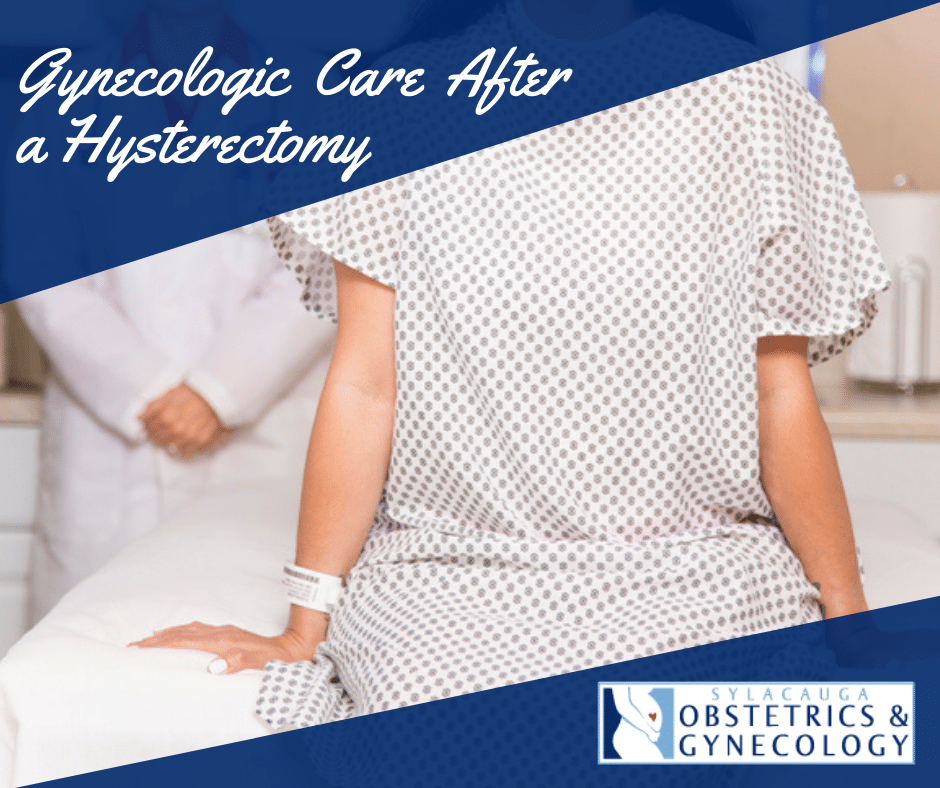
21 Apr Continued Gynecologic Care After a Hysterectomy
By Emily A. McInnis, D.O.
Hysterectomies are one of the most commonly performed procedures in the U.S., but we have found that many of our patients at Sylacauga OB-GYN have questions about this surgery that could be performed at various stages in a woman’s life. We want to be there with you through all of these stages, especially when the considerations and decisions may be emotional.
In this article, we will focus on what you can expect from gynecological care after having a hysterectomy and what changes may occur.
Hysterectomy Basics
A hysterectomy is a surgical procedure that removes the uterus. A hysterectomy is recommended for various women’s health conditions, and it’s important to understand that after a woman has a hysterectomy, she will no longer be able to become pregnant.
A hysterectomy is performed for a range of health conditions, including:
- Uterine fibroids, or growths on the uterine walls
- Abnormal uterine bleeding
- Endometriosis
- Uterine prolapse, or other pelvic support conditions
- Chronic pelvic pain
- Reasons related to uterine, ovarian, or cervical cancer
There are various types of hysterectomies, including:
- Total hysterectomy – Removes the uterus, cervix, ovaries, and tubes
- Partial hysterectomy – Removes the uterus and cervix
- Transabdominal hysterectomy – Performed using an incision on the abdomen
- Laparoscopic assisted vaginal hysterectomy (LAVH) – Vaginal hysterectomy with the aid of laparoscopy
- Total laparoscopic hysterectomy – Uterus is removed using only laparoscopic instruments
Life After a Hysterectomy & Continued Gynecologic Care
To break down all the details, here are several common questions and answers:
Will I need to come in for an annual exam after having a hysterectomy?
Instead of a yearly annual, we can space it out to every other year as long as the hysterectomy was for a benign reason. This means that the hysterectomy was not performed for any type of female cancer or severe cervical dysplasia.
What will exams be like after a hysterectomy?
The annual exam after a hysterectomy consists of updating your medical/surgical/family/social history and making sure that you are up to date on screening exams such as mammograms, Bone Density (DEXA) scans, and colonoscopies as well as immunizations. It is also a good opportunity to check your vitals and review any concerns.
For the physical exam, we perform a breast exam and a pelvic exam; however you do not have to have a PAP smear if you no longer have a cervix. The pelvic exam allows us to assess the external genitalia, vaginal opening, vaginal walls, urethra, bladder, and ovaries if they still remain.
Will I continue to take birth control after a hysterectomy?
You will no longer need birth control for the purpose of contraception, or preventing pregnancy, after a hysterectomy. However, certain birth control methods can continue to be used to help with hormone replacement after a hysterectomy.
What physical changes are common after a hysterectomy?
Most of the physical changes after a hysterectomy are positive ones. If you were having severe cramping or heavy bleeding with your cycles, this will no longer be an issue. If your bleeding was the cause of anemia or low blood levels, this will also improve over time. If you had pain with endometriosis, removing your ovaries will stop the “fuel to the fire,” helping resolve any pelvic pain or pain with intercourse you were experiencing before your surgery.
Women also find that after a hysterectomy they are able to take better care of themselves. For example, exercising becomes easier without the obstacle of pelvic pain or bleeding. This leads to weight loss for a lot of patients and the motivation to maintain a healthy diet. Overall, women feel much better!
On the other hand, sometimes when ovaries and the uterus are removed before menopause, women enter “surgical menopause” and experience hot flashes, night sweats, vaginal dryness, or mood swings as any woman in natural menopause would. This is because the ovaries supply the body with estrogen. To prevent these symptoms, we will prescribe Hormone Replacement Therapy (HRT) at the time of your surgery. This is typically estrogen in either oral, vaginal, or transdermal formulations.
What is recovery like after a hysterectomy?
The healing time for a minimally invasive or laparoscopic hysterectomy is about two to four weeks, and an abdominal hysterectomy is four to six weeks. Of course, you will go home with pain medications if needed, post-op care instructions, and activity restrictions. We also have the ability to refer you for pelvic physical therapy if that’s needed post-operatively.
Making the Decision to Have a Hysterectomy with Sylacauga OB-GYN
Having surgery of any kind is a big decision, and one that we do not take lightly. We take that level of trust very seriously, and want you to be sure that you are comfortable with what we are doing and why we are doing it. We take the time to do ultrasounds, labs, and a thorough work-up before proceeding with surgery for this reason. We don’t want any unanswered questions before going to the operating room.
That being said, surgery can be an emotional experience. If you are having a hysterectomy due to a female cancer, this can be very scary, and we work closely with our oncology colleagues to provide you with the best care during what can be a trying and stressful time. We are with you every step of the way.
For women who are undergoing a hysterectomy for benign indications such as bleeding or fibroids, we have several discussions prior to surgery and make sure that this aligns with your wishes for future childbearing. We want you to be at peace with that decision and confirm that you are okay with not having more children. If you do want more children, there are several other avenues to explore and we would love to discuss those options with you as well.
You should always feel comfortable with your decision, and if you are not, please voice any concerns that you might have so that we can discuss these in more detail. In most cases, a hysterectomy is not an emergent procedure, therefore you have time to carefully think about your options before proceeding. We see great results post-operatively, and patients are pleased overall.
LEARN MORE ABOUT WHAT MAKES SYLACAUGA OBSTETRICS AND GYNECOLOGY A TOP PROVIDER
Sylacauga OB-GYN is the premier provider of obstetric and gynecological services in Sylacauga, Alexander City, Talladega, and the surrounding areas. From your first exam to your new little one’s delivery, our staff and providers are here to make your journey as smooth as possible. At Sylacauga Obstetrics & Gynecology, we are ready to answer your questions, provide support, and guide your process during your baby’s growth!
No need to drive to Birmingham to receive a superior quality of care for you and your impending bundle of joy. We are big town doctors with small-town care! Check out our website or give us a call at 256-487-9346 for more information or to schedule an appointment. For more information about healthy pregnancies, delivery options, and more, give us a call or email us at [email protected].


